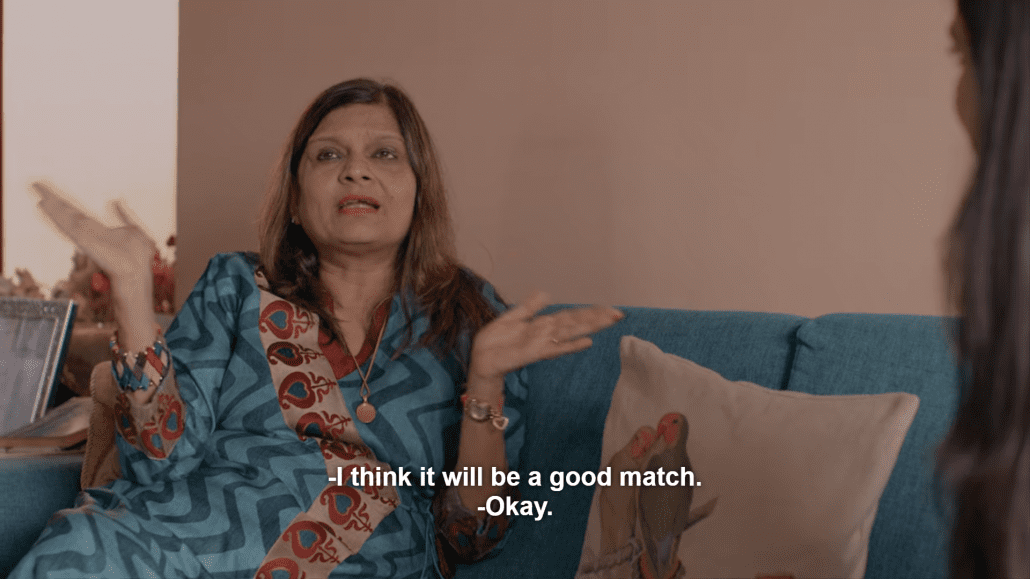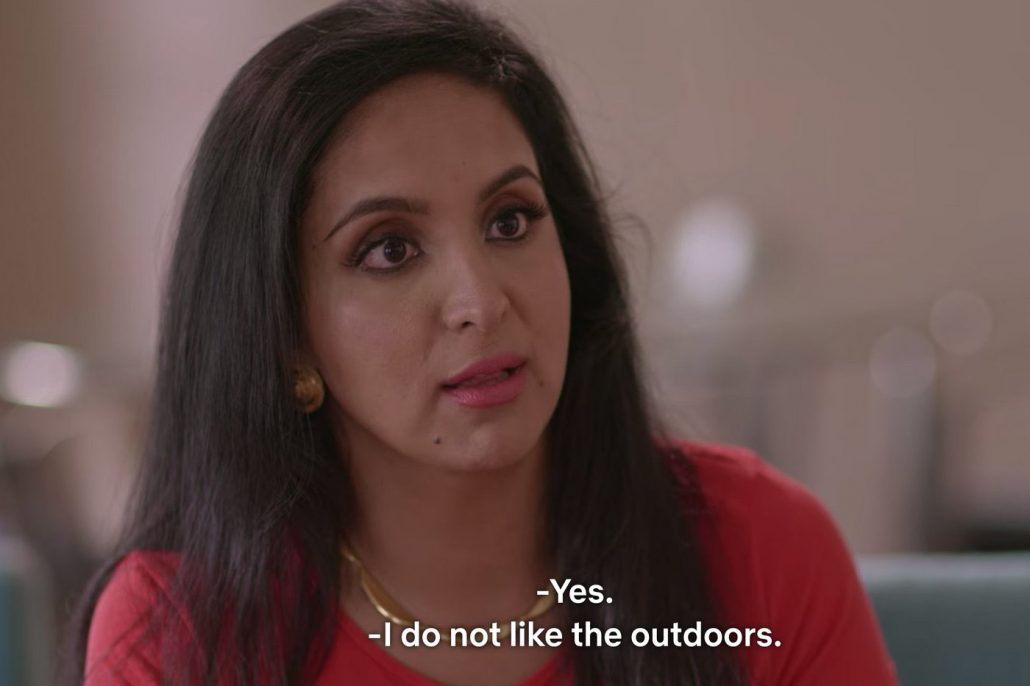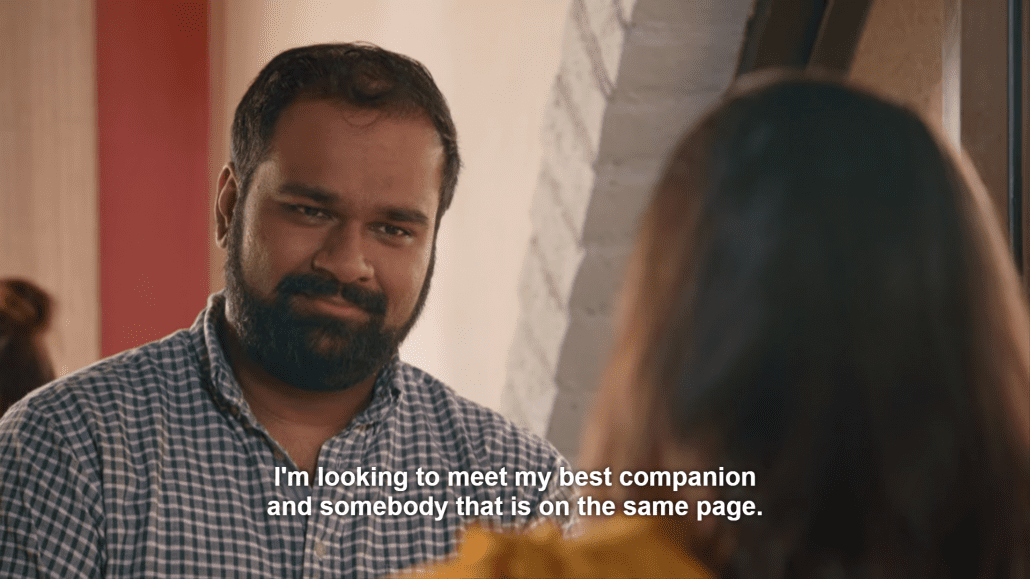Indian Matchmaking: 4 Reasons We Can’t Stop Watching
Images taken from Netflix
Who knew Indian Matchmaking would be the 2020 pick-me-up we didn’t know we needed? Netflix’s new show is going viral, and we’re all a little surprised at just how willing we are to binge-watch the full 8-episode season.
Sima Taparia, the show’s dedicated matchmaker, travels between India and the US as she meets with families and singles to find them a suitable partner. Her initial meetings with each client, whose stories we follow throughout the series, mostly begin with “the list”—detailed expectations and requirements each client has for a potential match. Sima takes those “must-haves” (as oddly specific and at times cringe-worthy as they might be), and creates a bio-data—a resume of sorts—to introduce potential mates who match the majority of the requirements.
As much criticism as we might feel for yet another reality dating show, the truth is, we can’t stop watching. Here’s why!
We want to know if there’s a formula that works.
It’s no secret that arranged marriages are a bit of a novelty for those who haven’t grown up in a culture where they’re common. But we’ve certainly experienced the brokenness of 21st century dating relationships. We’ve been dumped by the person we thought was our soul mate, or have started a new relationship only to learn the person isn’t anything like what we expected. Many of our families have been impacted by divorce. So, we can’t help but wonder—is matchmaking the answer? The secret formula we haven’t tried?

Only two episodes in, and we’re already anticipating the answer is probably, “no.” Guru, a fellow Guyanese-Indian-American, fit even Nadia’s most specific “wish list” item. But alas, their shared ancestry, his good looks, education, and height didn’t create the desired “spark.” As Sima put it, she “gave Nadia what she wanted—a Guyanese match—but it didn’t work out.” Our hope that matchmaking would work for Aparna and Srini, despite a solid family meeting and a follow-up date, didn’t last long either. Aparna rejects a proposal for a third meeting, and the scene closes out with a characteristic, “I will talk to you never.”
The truth is that all relationships—even the best ones—are still difficult, because they’re between people who are broken. We need help to make relationships work. And the only real help comes from the Holy Spirit who doesn’t fix all of our problems, but can guide us to a love that is patient and kind. That doesn’t envy or boast—that is not proud. The Spirit can guide us to a love that honors others, is not self-seeking or easily angered, and keeps no record of wrongs. Instead of delighting in evil, this love rejoices in the truth. It always protects, always trusts, always hopes, always perseveres. This love never fails (1 Corinthians 13:4-8).
Our hopes for matchmaking as the failsafe relationship solution we’ve never tried crash early on, but as the show continues to introduce more of Sima’s clients, we’re still invested. And that’s because . . .
We have to know what happens to these characters!
We can’t meet Pradhyuman, the Mumbai-based, impossibly rich and good looking young fellow who openly admits he isn’t sure if he’s ready to settle down, and not stick around to see if there’s a lady worthy of sharing his massive walk-in closet. And, as a few of the early season clients start to settle into relationships with prospects, we’re still not convinced that Aparna will ever find someone who appreciates her aggressive distaste for beaches, children at weddings, football, Disneyland—oh, and relaxing?

Some of the characters are presented as unreasonable, and we can’t wait to see how they handle awkward first dates. And, by meeting these men and women who share quirky qualities and uncomfortable expectations, we are almost forced to consider our own idiosyncrasies. Where do we hold unfair expectations of others? Where are we selfish? How can we become more self-aware and find healing from the broken places in our hearts and souls?
In a book titled “Ezekiel,” the author suggested that the audience’s only hope for restoration came from God who could take their hearts of stone and make them into hearts of flesh (Ezekiel 36:26). Our own hearts become alive when the Holy Spirit enters and transforms us. Only then can we discover the brokenness in our own stories, and experience healing and growth as God continues authoring our journeys and developing our character.
The social commentary is painful and also hilarious.
Whether it’s Nadia and Vinay’s shallow connection over a shared distaste for ketchup, or Pradhyuman’s superficial persistence in only considering the women with the most beautiful photos, Indian Matchmaking’s production team has a knack for exaggerating social realities that we can all relate to (and are perhaps embarrassed of).

One of the most telling lines in the series is, “They [my future mate] need to fit into my life.” Because what we watch is person after person trying to find someone who not only checks their boxes, but is willing to become whatever they want the other person to become—however specific and trivial certain characteristics may seem.
Although Indian Matchmaking illustrates this in an extreme way, many of us approach relationships with peers, friends, or potential mates with this mentality. We want them to like what we like, to show us love in the way we want to be shown love, to buy us things, and to seek our success. But God shows us a better way, and invites us to lay down our interests for others (Philippians 2:4). He invites us to be devoted to one another in showing love (Romans 12:10), and to seek the good of those around us (1 Corinthians 10:24). Far from selfishly (and, as we learn, unsuccessfully) looking for the person who will shapeshift to fit into our lives, we are called to love sacrificially.
It makes us reflect on our own relationships.
And we think the primary reason we can’t stop watching, Indian Matchmaking, is because we all long for the perfect partner. Marriage is a big deal, and whom to marry is an important decision. The show helps us process not only what we are looking for in the perfect partner, but offers us a chance to consider what we are doing to become one.

God created us to have healthy relationships with others, but healthy relationships are not just about who we find. Healthy relationships are also about who we are and who we become. A Christian teacher from a few thousands years ago put together a list of qualities to strive for. Just a heads up, this list is literally impossible to accomplish without God’s help, but we can begin showing these qualities as we are transformed to become more like Jesus. The list includes, “Love, joy, peace, patience, kindness, goodness, faithfulness, gentleness, and self-control” (Galatians 5:22-23). Maybe that should be our new “must-have” list we use to search for the right mate and to become the right mate for someone else.
That’s not to say we can’t have a few preferences picked out. We can look for someone who wants to travel, or have kids, or who is taller than we are. But by the end of the series, we’re more convinced than ever that we will have the most success if we hold those preferences loosely, and search for someone who is leaning on the Father, Son, and Holy Spirit to become the person we’re looking for. And may we ask God to help us become the person who is willing to follow Jesus’ example and lay down our lives for the sake of others.












This article is trash. It has no place in a Christian magazine/website. How does this encourage someone in their faith and walk with God?
All this does is to promote a show which as believers we can do without watching.
Thank you for reading the article and taking time to share your thoughts with us. Indian Matchmaking is a show that has gone viral, which means that many Christians are already watching the show. As a result, many people are being influenced by what they see and hear.
At YMI, we want to help fellow 20s and 30s engage culture through the lens of God’s wisdom. We hope that an article like this will show how the story of Jesus helps us navigate stories like these, and guides us to a better way of processing and engaging in (this case) relationships.